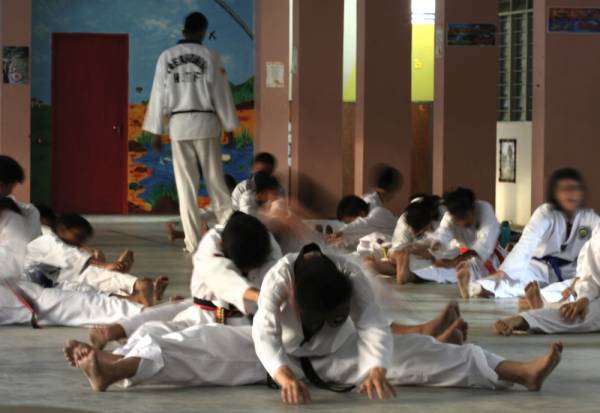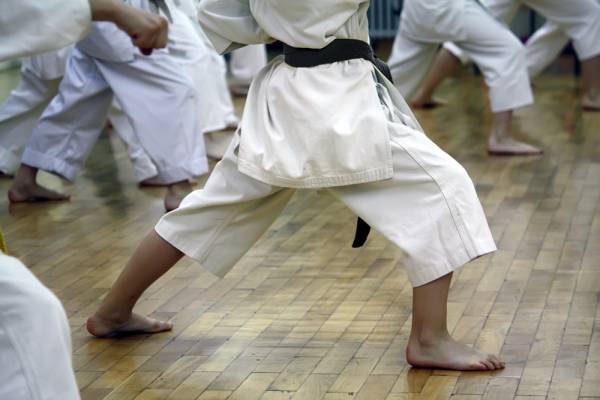Performance is everywhere we turn. Interviewing for that next job. Going on that first date. Competing in your local fitness competition. In order to succeed at anything, you must be prepared to perform and compete.
In a perfect world, everyone should be afforded respect and equality. But in the real world, the harsh truth is that everything is a performance or a competition. Everything.
What Martial Arts Teaches Us About Peak Performance
The oft-used analogies when it comes to competition are that of both the warrior and the athlete. A martial artist is both. Furthermore, a martial artist is, of course, an artist. In addition to sport and combat, there is much to learn from the martial arts when it comes to finding your peak performance.
I grew up around the arts. My mother performed professionally as a ballet dancer for more than twenty years, my uncle fronted a jazz quartet for a living, and my dad ran a creative business as a marketer. I followed suit performing on stage as an actor and also became a martial artist in my adult life.
From the arts, I learned much about what it takes to compete in life. Of course, the typical correlations to performance always apply – hard work, preparation, and attitude all matter. But what brings these attributes about? Telling someone to work hard falls on deaf ears without the “why” behind the hard work. Telling someone “attitude is everything” accomplishes little without the key to unlocking the passion that brings about that attitude.
This is where the arts (martial and otherwise) tell us much about competition because the foundation of the arts is asking the “why.” Finding trust, authenticity, and your true competitive spirit is what the way of the artist is all about.
Nurture Your Instrument
Any performer knows that if his or her instrument isn’t in top condition, then the performance could be compromised. That means cleaning, treating, and maintaining your instrument. A skier sharpens his skis, a musician tunes her instrument, and a singer nurtures her vocal cords. In order to be at one with your instrument – be it your body, a musical instrument, or a presentation piece – you must take care of your instrument the way you would your own child.
For athletes, your instrument in competition is your body. In my kung fu days, we used to have three-hour Saturday classes. One hour was dedicated solely to stretching. That is, one third of the time in class was purely about nurturing our instrument in order to prepare it to optimally perform. Said another way, in order to perform at your peak, constant and thorough maintenance is required.

Where You Prepare Matters
To borrow a line from Christopher Walken on Saturday Night Live, when you rehearse you must “really explore the studio space.” The line is both spot on, as well as hilarious, because that is what we do when we rehearse – we explore the space. We try, we innovate, we fail. Your rehearsal space must allow for creativity, trying new things, and resolving conflict.
For the athlete, this proces starts with locating a space that allows you to do your best preparatory work. In the martial arts, a boxing gym, dojo, or dojan is sacred ground. Many gyms and schools have some sort of ritual upon entering, be it a bow or a momentary pause of respect. The idea is to immediately get your mind right when you show up to rehearse. Stepping into a rehearsal space should be like stepping in to a church or sanctuary. Your sole purpose is to find the present moment in order to listen and grow.
How You Rehearse Is How You Will Perform
There are many old adages to this effect – act as if or practice makes perfect. I recently attended a lecture by a former Navy SEAL who said they even have a saying: when in doubt, rehearse. While there is no substitute for a real competition – the bright lights, the adrenaline, and the live audience – rehearsal is the gateway to that moment.
One of the critical components of rehearsal is the concept of contingency. As an actor, I have practiced scenes by saying my lines backward or as fast as possible. I’ve rehearsed scenes blindfolded and I have done scenes without the lines. The idea is to have a plan for every possible scenario, but to end at the same destination.
I’ve done similar things in sparring in the martial arts. Sparring with only one hand, using only kicks, or throwing only punches. Sparring might entail taller, heavier, or shorter opponents. The bottom line is that practice is not merely repetition, but preparation for the certainty of uncertainty.
Find Your Feet on the Floor
One of my teachers used to begin every class with this simple instruction: “Feel your feet on the floor.” Inevitably, a new student would roll his eyes as if to say, “What exactly is that supposed to mean?’ Feeling your feet on the floor has to do with being grounded and present, to actually feel your feet against the ground.

Starting at the ground, you can determine things like: What does the ground feel like? What do your feet feel like? Are you heavy or light? The answers to questions like this are a starting checklist to getting present.
Another way to feel your feet on the floor is to “see” your breath. Every breath connects you to your body and the ability to be whole and present. In order for an athlete, artist, or warrior to be at his or her peak, the performance must start with being present and the ability to find the feet on the floor.
Trust and Authenticity Trump All Other Values
Trusting others – teammates, partners, and so forth – is a given when it comes to peak performance. Anyone knows that to forge a successful relationship, trust matters. But what about trusting ourselves?
Malcolm Gladwell, in his book Blink, asserted that our intuition is always right. Your intuition knows the correct next step to take, but is often blocked by a desired outcome – to get the job, find love, or win the competition. The key to trusting your intuition is self-awareness.
Bruce Lee, widely considered the greatest martial artist of all time, spoke volumes on the subject of self-awareness. “The possession of anything begins in the mind,” he stated. He also pointed out that the biggest obstacle a person can face in competition is our self. “Fear comes from uncertainty; we can eliminate the fear within us when we know ourselves better.”
This is what my teacher was driving at when telling us to find our feet on the floor. To know ourselves, to find that quiet spot in our mind in order to trust the process, and more than anything – to trust ourselves.
Photos courtesy of Shutterstock.






